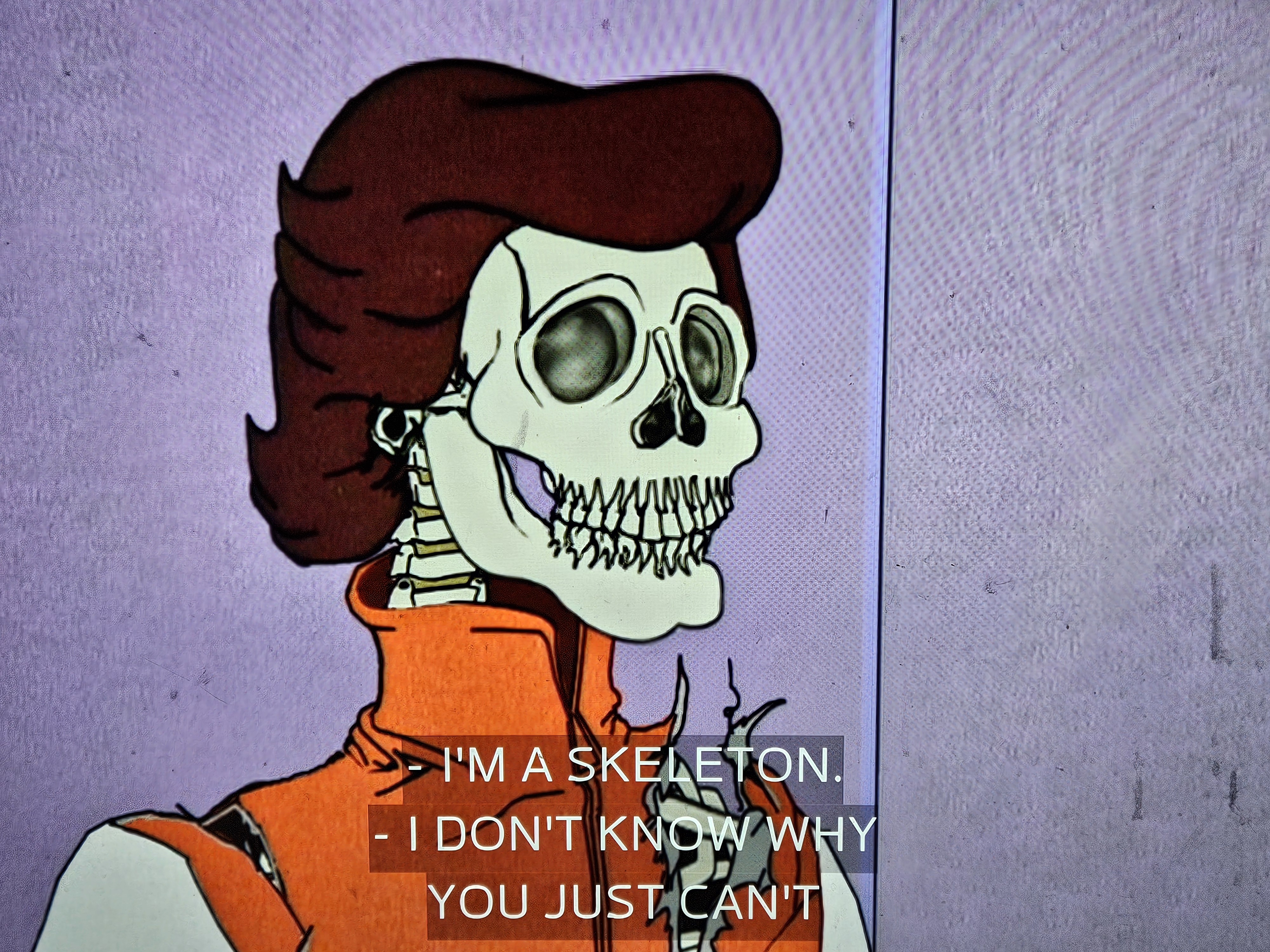skeleton with a pile of rocks on top of him
with a note next to him that says ‘i sure hope these rocks don’t fall on my head’
“Gerg told me the mine supports we’re using were creaking the other day. Idiot took some ore and ran off in the middle of the night. He doesn’t know what he’s talking about, I’ll show him”
This is quite literally content in one of the Skyrim mines lmao
They’ve had me working down here for days now. It’s not the time that’s getting to me though, it’s these tunnels. I’ve told them countless times now to add extra supports to the weak sections of tunnel.
If only we had more of those wooden beams that we reinforced with bronze bottoms. Honestly, if I hear the earth shift one more time above my head I’ll be so stressed I may stop drinking for good. I mean, what’s a Nord without his mead?
that was the one I envisaged lol
And I swear he’s got a shit bucket too
nvm actually
same mine different dead end

Hell yeah
This guy is implied to have died on the toilet. Funniest shit I’ve ever seen. Put it in every game 20 times, that’ll make it funnier
Is it time for more Bethesda slander?! Let’s gooo

“It just works”

In Todd We Trust

the best thing about them is their name. it sounds cool. every game they’ve ever made was fugly.
with starfield they didn’t even bother putting in skeletons
Not enough skeletons. Dreck C-With Starfield, you get to read the same email about the same thing from and to the same people in the exact same location with the exact same loot containers and the exact same enemy spawns multiple times… but on a different planet!!! WHOAAAAAAAAAA
I’m genuinely stumped just how bad exploration in Starfield feels. There must genuinely be like a fifth of locations in this game as in any other Bethesda game before it (which somehow manage to be even more samey and boring than their usual stuff), and then they stretch them out over a world that is magnitudes larger. The fact that there aren’t any random variations in these locations themselves is mindboggeling, since none of them even feel like any amount of thought greater than that of a random stupid procedural algorithm went into them even when you first play them. Starfield is astonishingly bad, even for the ever lowering and incredibly lowstandard that has been Bethesda for two decades. I don’t think anyone with talent still works at that studio, but certainly not in any position where they make creative decisions. I could rant for hours about this terrible waste of human resources. (sorry to the around 3900 people that had to work on this game)
You know whats sad? That WAS the best environmental storytelling people had
Disagreeing here, the original STALKER came out a year before and it had way better enviromental storytelling because it didn’t rely to much on wackiness like FO3 and even with the A-Live system gimped to no end you could come across entirely diegetic, non planned enviromental storytelling where you could feasibly backtrack what happened.
Like a line of dead pseudodogs coming up to an electro-anomaly with a dead stalker in it and in the distance you could still see one or two of them limping about
Honestly I can’t think of game that did it better than the STALKER series for faction mechanics, spawning, ai, and non-scripted environmental story telling. The way they did it the world felt alive and it was with much worse capabilities than now. That was the one game it really felt that you the player character weren’t the sole force of history in the game.
Also Skyrim and Dark Souls came out the same year.
There’s a neat Russian game series, Space Rangers, which also hit some of those vibes for me.
STALKER early in its development had some marketing blurb about “the AI being able to beat the game without the player”, which is pretty dubious (it may have been sort of technically true at a very early stage when the game didn’t really have much of a story or missions, but it’s definitely not true for the finished product, which does have a more conventional narrative running through the game that you as the player are the driving force of), but in Space Rangers 2 this actually can nearly happen in the lower difficulty modes - you’re not playing as some chosen hero, you’re just a volunteer soldier in a big war, a war which goes on without you - star systems are captured and lost, the military organizes expeditions, technology advances over the course of the game with new weapons and ship models becoming available, and eventually, the AI can indeed whittle the enemy down to pretty much one or two final star systems. It was pretty nifty.
I really wish this whole “simulating deep systems that allow gameplay situations (and maybe even whole stories) to naturally emerge” approach (seen in these games, immersive sims, and I guess to some extent grand strategy games) was more popular, but it is pretty difficult and risky. It’s part of what makes Bethesda’s trajectory even more disappointing - at the time of Oblivion, they were actually exploring some of the same ideas of detailed AI routine simulation as STALKER (just tailored more towards “citizen” NPCs, ones who have homes and jobs and families, and thus routines revolving around that, while STALKER’s guys are more nomadic wanderers getting into hijinks)… but the Radiant AI system didn’t end up going anywhere, it was very jank but instead of trying to further develop it they’ve been progressively cutting it down more and more, and apparently in Starfield there’s not much of it left.

I really wish this whole “simulating deep systems that allow gameplay situations (and maybe even whole stories) to naturally emerge” approach (seen in these games, immersive sims, and I guess to some extent grand strategy games) was more popular, but it is pretty difficult and risky.
As a software engineer who’s been doing this for quite a while, the reality of software is that software is made in spite of the management of the business. That’s always the #1 hurdle.
So when you have a deep simulation system you get a market problem like with No Man’s Sky. It takes a long time to make a good deep simulation system, it’s difficult to merge that deep simulation system with the capability to do narrative traditional game design to create a story and quest line beyond just simulating faction control of a map or wildlife, etc. At one point you cannot actually sell “the computer makes the game”, you have to have a basic experience everyone can have.
But the real difficult part is to explain why this is so hard to brain dead morons who you have to beg for resources to do anything, and their pea brained limited imaginations can only think about things that they know of that have already have been made – if that.
So ultimately big unique projects like this are often shouldered by individual tech leaders in companies usually to the detriment of their health and without any reward practically equivalent to the work.
it’s difficult to merge that deep simulation system with the capability to do narrative traditional game design
Definitely, games that try this do need to abandon traditional narratives to some extent, which is a big ask for a typical publisher - and unfortunately, the complexity of such systems also puts them out of the reach of indie games which can otherwise afford to be more experimental (although Rain World is supposed to have some pretty amazing AI simulation too) - these kind of projects really have to be AA games, big enough to manage the complexity, but small enough to be allowed to actually do it instead of flattening everything in pursuit of more market share. And the AA side of the industry has unfortunately massively declined.
Space Rangers’ main narrative isn’t really much more than “liberate all star systems and defeat the big boss commanding the enemy” - there’s a bit of detail about the war itself, but it’s mostly revealed in big text boxes, which is moreso lore than narrative I guess. However, it’s still got plenty of stories, thanks to the baffling(ly amazing) decision to just stick like a 100 mini-text-adventure games in as side quests. Get caught by the cops for your piratical crimes and sent to jail? Oh boy, we’ve got a whole text adventure of you having to manage your relations with the prisoners and the guards, choosing who to snitch on, getting into, uh, trained cockroach races (?), ratting out the horrible prison conditions to journalists, and much more! There’s also presidential elections, cooking competitions, just a whole ton of random stuff, I have no idea what they were thinking but it turned out pretty great.
Grand strategy games like Crusader Kings also utilize such dynamic systems to great effect while forsaking typical narrative, but they’re their own niche (and while Paradox does make cool stuff, they do also nickel-and-dime people for like 100 different DLCs per game…)
Definitely, games that try this do need to abandon traditional narratives to some extent, which is a big ask for a typical publisher - and unfortunately, the complexity of such systems also puts them out of the reach of indie games which can otherwise afford to be more experimental (although Rain World is supposed to have some pretty amazing AI simulation too) - these kind of projects really have to be AA games, big enough to manage the complexity, but small enough to be allowed to actually do it instead of flattening everything in pursuit of more market share. And the AA side of the industry has unfortunately massively declined.
I tend to disagree. Dwarf Fortress was made by 2 people. The biggest problem is that the cap-ex of discovery of how these systems should work makes it very difficult to attach the rest of the “game design” portion of the industry to it. Companies make idiotic time tables, a company would not be able to release Dwarf Fortress even with a AAA budget and the game as it exists today simply because there’d be too many meetings for every time you realize a disastrous edge case in the simulation causes rework and scheduling delays for all the assets.
Also just as an aside I think a lot of this is hella worse during post-covid, not just from a cost of doing business POV, but from a explaining basic concepts to non-technical and technical people alike POV. I’m having a really rough go of it at my current company trying to get PMs, UX/UI designers, and even engineers wrap their heads around what it means to user interaction to have asynchronous jobs running in the background providing the functionality that was previously fully synchronous.
I’m having a hard time in the year of our lord 2024, explaining what multi-seat /collaborative data entry is, and how we need to start thinking about it instead of writing software for the 2000’s.
In my world an example would be, last year I rebuilt our data modeling system so that we can introspect our models, tag how their properties work in standard data functionality throughout the system, automatically generate types, type guards, validators, and factories as well as create generic functionality that uses the model tags as well as all the developer guard rails of linting organization, etc. This all supports structural typing, and is fully declarative. I did all this in 3-4 months. Which has been one of the fastest projects of this size/complexity that I’ve done in my life.
Every 2 weeks on the project I’d be in a meeting with people asking me if it’s done yet, and what’s plan b? The goal of the project was to support a bulk export system for arbitrary data in our system. There was no plan b. The only realistic plan b was to write import export functions for each and every data component that was used which would be slower to implement, less consistent and ultimately not fix our underlying issues that the modeling was crap. But there’s always the dumb guy question of “why is this not done yet?” and those can be asked basically for free by any available dumb guy.
That’s why people don’t take risks, interesting things don’t get built. You get just get burn out as a reward.
Grand strategy games like Crusader Kings also utilize such dynamic systems to great effect while forsaking typical narrative, but they’re their own niche (and while Paradox does make cool stuff, they do also nickel-and-dime people for like 100 different DLCs per game…)
Honestly I don’t really mind this… the DLCs go on sale a ton, and it’s honestly the only realistic way to fund a modern game. Otherwise games just wouldn’t get updates free or otherwise. We can argue about price points or the efficiency of the way these games are made and designed and what that means to the theoretical cost of upkeep (e.g. DLC) but I’m gonna have to tap the sign:
the reality of software is that software is made in spite of the management of the business. That’s always the #1 hurdle.
in Starfield there’s not much of it left.
I don’t think there’s any of it left. NPCs at most just sort of path around some patrol route, they’re not even running through a timed schedule or anything like that. I guess NPCs on ships or in outposts randomly pick an object to interact with and go do an animation by it, but that’s also unscheduled and is just a glorified random idle animation.
(it may have been sort of technically true at a very early stage when the game didn’t really have much of a story or missions, but it’s definitely not true for the finished product, which does have a more conventional narrative running through the game that you as the player are the driving force of)
They can’t finish the game but unpatched STALKER SoC absolutely allowed mission critical NPCs to die or objectives to just resolve themselves by random mutant spawns or whatever, which is why all the important NPCs all have PDAs with the shit you need. I still feel like this gets pretty close.
Shadow of Chernobyl predates even Demon’s Souls by 2 years which is why one of the hills I’m dying on is that the genre should be called the stalkerlike instead of the soulslike because the important, all combining factor is the game basically treats you as an NPC as per power and such, you only have your wits to excel
all combining factor is the game basically treats you as an NPC as per power and such, you only have your wits to excel
Rogue came out in like 1980.
Fair point but neither games have permadeath re-run mechanics that I’d argue characterize the roguelike
Yeah but how many people played STALKER 1 vs FO3 or Skyrim? I’m absolutely confident there were indie games with better storytelling at the time and there were far older games like Planescape or Systemshock that were doubtlessly better as well. But people didn’t play those at the time. For a lot of people, Bethesda games were the best they saw. This is not an endorsement of Bethesda lol
STALKER and FO3 both suck major ass at conventional storytelling, albeit for different reasons, you’ll find no objectives that Planescape or Systemshock or an indie game blow them out of the water, albeit indie games pre 2007 is a pretty small category on account of you needed a publisher to send those DVD arounds, you just got like a lot more weirdo A or AA games instead of the AAA++S-Rank shit only you get today.
Enviromental storytelling though I’ve still not seen STALKER beaten, albeit I fell off the wagon per gaming a while ago. Mind giving some examples here?
I also think STALKER and FO3 would’ve been popular in similar circles back then, STALKER was called oblivion with guns before FO3 came out
Ultima Underworld was doing this ten years earlier and better.
Hell, Myst was doing this earlier and better.
It’s literally just funnily-posed skeletons. There’s a pair in FO4 Concord where one’s strangling another over a safe
God I can only wonder what happened there. Guess I’ll never know
great enviromental storytelling is when you can figure out someone was strangled to death and the strangler also died of a random heart attack at that exact moment how wacky
There are too many skeletons, please eliminate three
PS I am NOT a crackpot
Have you heard of the High Elves?
That’s a very normal discussion people have I guess
the last 10 years in america been like this.
“yo, you heard about the high elves? they eating cats and dogs out in cyradil”
“i heard the dark elves skooma dealers took over an high house in windhelm”
Oh shit, OOP is the indie dev who is allegedly working on a game called Sheep Lad, which is a souped-up Zelda II: The Adventure of Link-esque Metroidvania with some pretty deep sword fighting mechanics. They’ve been picking at it for a couple of years now.
Project Zomboid has some pretty decent environmental storytelling, but sparse.
Some of the best environmental storytelling in gaming is when you are introduced to the Flood in HALO for the first time. Now that is a masterclass in environmental storytelling.
Oh boy, its another forty miles of purple corridors. I’m having so much fun.
(I keed. H1 story was generally a ton of fun.)
I feel like this sort of conversation could only happen now with someone who thought of themselves as a gamer when Skyrim (or oblivion) came out, played 70 hours of it and some other pop titles around that time, and then stopped playing video games.
I will forever hate Bethesda sorry













